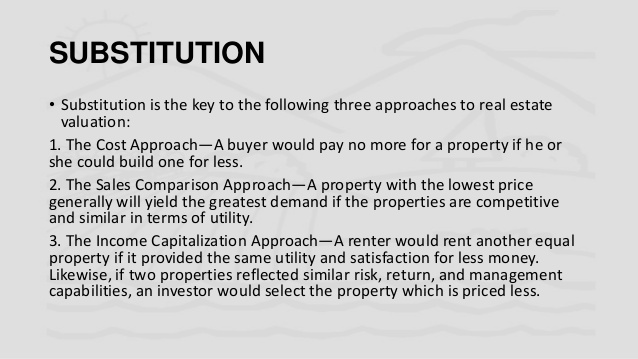Principle of Substitution Explained
This may sound like something involving high school. It does because that is where you learned economics. The Principle of Substitution involves economics. We use the Principle of Substitution every day in our lives. Many times we don’t realize it’s what we are doing. You buy what is on sale every time.
What is Principle of Substitution?
The Principle of Substitution is defined as,
The principle of substitution states that the upper limit of value tends to be set by the cost of acquiring an equally desirable substitute.
This means when you shop for detergent at the grocery store you buy what is on sale if you view it as equally as good. You buy the best possible product for the money every day. You also do the same with Real Estate. I have never met anyone that happily pays too much for anything.
How Does it Apply to Real Estate?
The principle of substitution applies in every deal in Real Estate. As a wholesaler that is your focus when you put a property under contract. It’s important to understand how to value Real Estate so you can explain why a property is only worth so much. That’s are what comps are in effect. They are substitutes for the property you are buying.
I think a 1031 like-kind exchange is probably the Principle of Substitution in Real Estate in its most true form. Even though 1031’s are manipulated for tax purposes you can exchange anything of similar value. You can combine almost anything to get to the amount needed to exchange.
A patio home is also a good example. In most cases patio homes are identical. They may be left or right handed for the front elevation but most everything else is the exact same. This is why you see lower prices with this type of home. They are always on sale because the price is the only way they can get their house sold. The lowest priced homes typically sell first if all else is equal.
How Wholesalers Can Use it to Their Advantage
The first thing a wholesaler has to realize is a seller knows the differences in their house and their neighbors. You aren’t going to tell them anything they don’t already know. You are a guest but they live there.
When you find comps that would substitute for their house you explain the differences in a professional manner with facts. You never mislead a seller. That can come back to bite you. Honesty is the best policy in Real Estate.
When you explain why the other house sold for more you also need to explain the process of renovation and cost associated with it. Again, they already know what you are telling them. You can be sure they have received at least one estimate to repair anything that is wrong. If they haven’t they likely know it’s too expensive for them to repair.
You could explain the neighbor that sold has hardwood floors and that is what is selling in the area. The house you are buying has carpet so you will have to update the flooring to attract a potential buyer. You can benefit with a lower price from the seller by explaining the substitution in a polite way without going overboard.
It’s important to build value for a higher sales price to a potential buyer. It’s also important to lower value for a lower sales price from a seller. If you aren’t practicing the Principle of Substitution on both sides of the deal you are leaving money on the table.
Final Thoughts
The next time you go to Wal-mart or the mall it’s a good idea to start practicing the principle of substitution. When you can apply it to your every day life it will become as easy to apply to Real Estate. A house has every disposable good made almost from tvs to clorox. What you buy in substitution every day is what creates the value of Real Estate except it’s building materials not clorox. To the contrary, everything you have to buy to renovate lowers the value. I hope you see the correlation.
Would you trade a $20 bill for a $5 bill? The principle of substitution is all around you.


